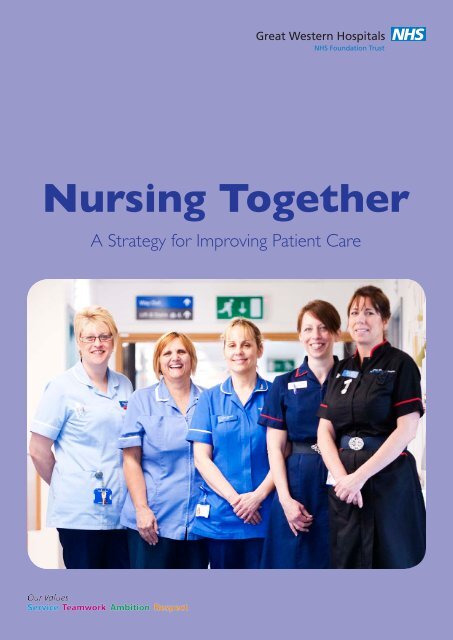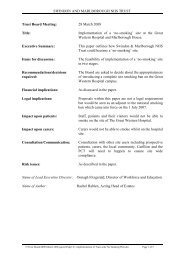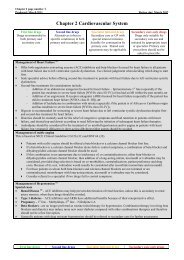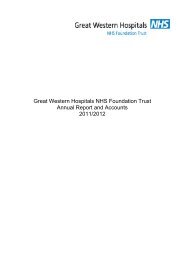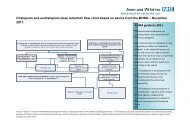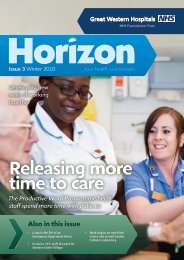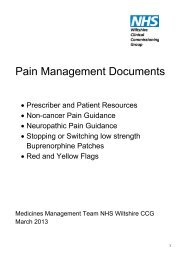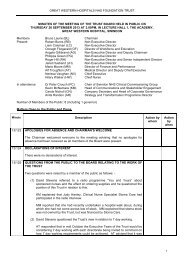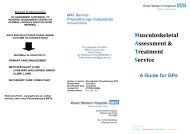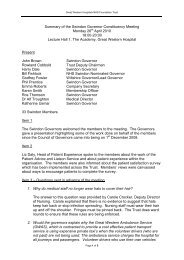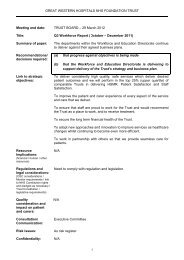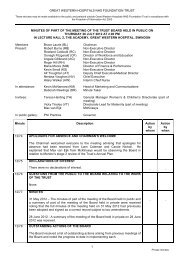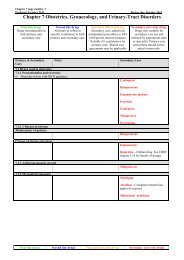Nursing Strategy - The Great Western Hospital
Nursing Strategy - The Great Western Hospital
Nursing Strategy - The Great Western Hospital
You also want an ePaper? Increase the reach of your titles
YUMPU automatically turns print PDFs into web optimized ePapers that Google loves.
<strong>Nursing</strong> Together<br />
A <strong>Strategy</strong> for Improving Patient Care<br />
<strong>Nursing</strong> Together: A <strong>Strategy</strong> for Improving Patient Care 1<br />
x
Contents<br />
Messages from the Chief Executive and the Chief Nurse 3<br />
Introduction 4<br />
Context <strong>The</strong> image of nursing 5<br />
<strong>Nursing</strong> and Care Quality Forum 6<br />
National strategy for nursing and midwifery care 7<br />
Developing the strategy 8<br />
A. Leading the best patient, relative and carer experience 9<br />
B. Strengthening leadership and professional practice 10<br />
C. Driving improvements in safety and quality of care 12<br />
D. Delivering effective and efficient services 13<br />
E. Leading a happy and healthy work life 14<br />
F. Measuring impact and improvements 15<br />
G. Delivering a workforce fit for the 21st century 16<br />
“<strong>The</strong> Wiltshire Involvement Network<br />
(WIN) welcomes the newly developed<br />
<strong>Nursing</strong> <strong>Strategy</strong> for the <strong>Great</strong> <strong>Western</strong><br />
<strong>Hospital</strong> and recognises the amount of work<br />
it took to produce the strategy. WIN also<br />
supports the <strong>Great</strong> <strong>Western</strong> <strong>Hospital</strong> in its<br />
implementation.”<br />
x<br />
2 <strong>Nursing</strong> Together: A <strong>Strategy</strong> for Improving Patient Care<br />
“Swindon Local Involvement<br />
Network (LINk) steering group welcomes<br />
the publication of the GWH <strong>Nursing</strong><br />
<strong>Strategy</strong> within the local community and the<br />
importance attributed to patient experience<br />
and feedback. In the ensuing months we and,<br />
no doubt our successor Healthwatch Swindon,<br />
will monitor and publicise performance.”
Message from the Chief Executive<br />
It is entirely appropriate that we should be<br />
setting out our strategy for nursing at this<br />
pivotal time in the Trust's journey. I know from<br />
the feedback that I receive that patients and<br />
the public continue to place great value on<br />
excellent nursing care and recognise nurses as<br />
the backbone of our service.<br />
“Your passion,<br />
commitment<br />
and skills<br />
are crucial”<br />
I often hear heartwarming<br />
examples of the<br />
professionalism, dedication<br />
and attitude of individual<br />
nurses and teams that have<br />
such positive impacts on<br />
people's experiences of healthcare and I take<br />
this opportunity to thank you. <strong>The</strong> reputation<br />
of our Trust is important to all of us. We<br />
all should feel proud of the jobs we do and<br />
the difference we make and I value the<br />
contribution you make every day.<br />
<strong>The</strong> coming months and years bring fresh<br />
challenges as well as some familiar ones. With<br />
the growing demand for healthcare from an<br />
ageing population at a time when finances<br />
are getting tighter, the need to rethink how<br />
services are provided becomes increasingly<br />
important. You are our partners in helping us<br />
rise to meet these challenges. Your passion,<br />
commitment and skills are crucial in the<br />
redesign of patient pathways and helping us<br />
deliver care in a different and more<br />
innovative way in the future.<br />
Nurses are central to the services<br />
we offer. It is essential we continue<br />
to focus on sustaining and improving<br />
standards of practice, so I am<br />
pleased to endorse<br />
the nursing strategy<br />
and look forward to<br />
seeing the impact<br />
on both outcomes<br />
for your patients<br />
and your own job<br />
satisfaction.<br />
Nerissa Vaughan<br />
Message from the Chief Nurse<br />
I want every nurse at <strong>Great</strong> <strong>Western</strong><br />
<strong>Hospital</strong>s NHS Foundation Trust to be proud<br />
to be a nurse and proud to<br />
work within our Trust. I want<br />
our patients and those close<br />
to them to experience the<br />
best nursing from a caring,<br />
professional and competent<br />
workforce.<br />
“Together we<br />
can take front<br />
line patient<br />
care to a<br />
higher level”<br />
This strategy sets out to<br />
build on all that is good about nursing in the<br />
Trust, strengthening in breadth and depth our<br />
contribution to health services designed with<br />
the patient at the centre.<br />
I have been delighted by the level of<br />
engagement and motivation amongst nurses<br />
as we have worked to develop our strategy.<br />
<strong>The</strong> clear links to the Trust’s STAR values<br />
and strategic objectives demonstrate how<br />
the important work of nurses will<br />
contribute to the achievements and<br />
success of the organisation.<br />
I am confident that together we<br />
can take front line patient care to a<br />
higher level<br />
and I record<br />
here my<br />
commitment to<br />
providing the<br />
leadership and<br />
support needed to<br />
achieve this.<br />
Hilary Walker<br />
<strong>Nursing</strong> Together: A <strong>Strategy</strong> for Improving Patient Care 3<br />
x
Introduction<br />
Current NHS policy drives us to develop innovative and efficient services, while improving quality and<br />
establishing better integration. <strong>The</strong>re is a desire for a stronger patient voice and greater accountability.<br />
At <strong>Great</strong> <strong>Western</strong> <strong>Hospital</strong>s NHS Foundation Trust the joining together of acute hospital services<br />
with community provision across Wiltshire in 2011 has left us well placed to maximise the<br />
opportunities to transform patient pathways and deliver care in new ways.<br />
Throughout the transformation of our services, the delivery of safe, high quality, effective and<br />
compassionate care relies on nurses working across a clinically and geographically diverse range of<br />
settings to provide patient-centred care 24 hours a day and 365 days a year. <strong>Nursing</strong> care remains a<br />
critical measure of quality for most patients and their families in regard to the services they receive<br />
from us.<br />
This nursing strategy therefore sets out the ambitions and priorities for the next two to three years<br />
and aims to:<br />
• Set the strategic direction of travel for the Trust’s nursing workforce<br />
• Provide a clear framework for the nursing workforce to deliver the Trust’s vision and strategy,<br />
aligned to local service strategies<br />
• Provide a framework for professional governance and assurance, including the development<br />
requirements underpinning these<br />
• Provide a framework for professional communication within and across the nursing workforce.<br />
4 <strong>Nursing</strong> Together: A <strong>Strategy</strong> for Improving Patient Care<br />
x
Context<br />
<strong>The</strong> image of nursing<br />
This strategy has been developed at a time of great national interest in and focus on nursing.<br />
Across this organisation (and across the country) there are examples of individuals and teams<br />
working tirelessly to deliver excellent care to the people who use their services.<br />
However, nationally, high profile failures in quality of care, ranging from isolated cases reported in the<br />
media to systemic problems in particular healthcare organisations, have demonstrated that there are<br />
problems with the quality of some nursing care, and some of these problems are very serious. While<br />
such cases are not representative of the quality of care that the majority of nurses deliver, we need<br />
to learn the lessons from all care failures and carefully design our systems and processes to drive up<br />
consistency.<br />
We must also be very careful not to lay all quality problems at the feet of nurses. <strong>The</strong>y are part of<br />
wider multidisciplinary teams and the system that wraps around them will either help or hinder them<br />
in achieving their ambition to achieve high quality care.<br />
<strong>The</strong>re are also growing challenges to providing care, including those presented by an ageing<br />
population. <strong>The</strong> time and skills needed to care well for a person with complex needs, such as<br />
dementia, are significant. But the bigger challenge is how we can design and promote services that<br />
meet the needs of people in the best possible way and in the most appropriate setting.<br />
Against this backdrop in April 2012 the Prime Minister, David Cameron established the <strong>Nursing</strong> and<br />
Care Quality Forum.<br />
<strong>Nursing</strong> Together: A <strong>Strategy</strong> for Improving Patient Care 5<br />
x
<strong>Nursing</strong> and Care Quality Forum<br />
This independent national forum, made up of a range of experts on nursing and care quality working<br />
across all settings, was set up to improve the quality of nursing care across all care settings. <strong>The</strong> forum<br />
was asked to explore:<br />
• How to promote and achieve accountable and empowered nurse leadership across the system<br />
• How to make sure that the right culture and the right values that put patients first prevails at all<br />
times<br />
• How best to involve, listen to, hear and respond to feedback from patients and staff<br />
• How to make sure that those providing care have the time to do so properly.<br />
<strong>The</strong>ir early recommendations have been accepted by the government and are reflected within this<br />
strategy. <strong>The</strong>y are summarised below:<br />
1.<br />
2.<br />
3.<br />
4.<br />
5.<br />
6.<br />
So that nurse leaders, whether ward or community based, have time to lead and be accountable<br />
for their clinical area they should be fully in charge and supernumerary. Achieving this should not<br />
be centrally prescribed, but driven locally by clinicians and managers working together.<br />
Organisations should seek ways to ensure their systems, processes and resources support their<br />
nurse and care leaders to have authority to act and make decisions relating to their teams and<br />
the people they care for. Where barriers exist that prevent this being achieved, they should be<br />
removed.<br />
New leadership development and support is needed to equip our nurses with the necessary<br />
skills and competence to lead their team effectively.<br />
Organisations should make sure nurses are recruited for their caring nature and compassion as<br />
well as their knowledge and skills<br />
Leaders of organisations should ensure appropriate staffing levels and skills mix are in place, and<br />
boards should be held to account for this<br />
Organisations need to work to increase the number of staff who would be happy for their friends<br />
and family to be treated at the same place they work.<br />
6 <strong>Nursing</strong> Together: A <strong>Strategy</strong> for Improving Patient Care<br />
x
National vision and strategy for nursing and midwifery care<br />
Concurrently Jane Cummings, Chief <strong>Nursing</strong> Officer for England has been developing a vision and<br />
strategy for nursing and midwifery care since her appointment this summer. Her key aims are to<br />
improve quality of care and patient experience, increase the respect for the profession and to<br />
increase the number of nurses and midwives who are proud of their role.<br />
She has built a vision around the 6 ‘C’s.<br />
Care: delivering high quality care is what we do. People receiving care expect it to be right for them<br />
consistently and be part of their care decisions<br />
Compassion: is how we feel about the care we give and how it is perceived. It means care given<br />
through relationships based on empathy, kindness, respect and dignity<br />
Competence: means we have the knowledge and skills to do the job and the capability to deliver<br />
the highest standards of care based on research and evidence<br />
Communication: good communication involves better listening and shared decision making – “no<br />
decision about me without me”<br />
Courage: enables us to do the right thing for the people we care for, to engage with innovation and<br />
change and to speak up when things are wrong<br />
Commitment: is about how we work with each other and the public to drive up quality and to<br />
improve the health of the population. We need to commit to action to improve care.<br />
We have used quotes from our own nurses within our strategy document to demonstrate how the 6<br />
‘C’s are threaded throughout.<br />
Compassion in Practice, the new national strategy for nursing midwifery and care staff, was published<br />
on 4th December 2012 and identifies six areas for action which are reflected within this document<br />
too.. <strong>The</strong>se include ensuring we have the right staff with the right skills in the right place, delivering<br />
care and measuring impact, providing positive experience to people receiving care, supporting<br />
positive staff experience, engaging and involving the public and maximising health and wellbeing<br />
outcomes.<br />
<strong>Nursing</strong> Together: A <strong>Strategy</strong> for Improving Patient Care 7<br />
x
Developing the strategy<br />
This strategy has been developed through a process of engagement with front line nursing staff from<br />
across the organisation. Around 170 nursing staff have been involved in workshops to develop and<br />
agree the priorities for nursing in our organisation for the next two or three years. An initial ‘away<br />
day’ was used to generate the strategy domains and to start to define our ambitions. Subsequent<br />
workshops were used to shape and refine the initial work.<br />
<strong>The</strong> strategy document is set out under seven main headings or ‘domains’. For each domain we have<br />
defined an ambition for achievement and then identified our priorities for action that will help us to<br />
achieve our ambition.<br />
It is expected that the document will be used in a number of different ways:<br />
• For individual members of nursing staff to read and understand the direction of travel<br />
• For nursing teams to use to plan ward/service objectives<br />
• For Directorate leadership teams to use to ensure the professional nursing agenda is aligned to<br />
their service strategies<br />
• For the newly forming <strong>Nursing</strong> and Midwifery <strong>Strategy</strong> Committee to use to drive implementation<br />
and monitor performance against the plan<br />
• For other staff groups to understand key issues and priorities for nursing<br />
• For members of the public and other key stakeholders to understand key issues and priorities for<br />
nursing at GWH NHS FT.<br />
<strong>The</strong> <strong>Nursing</strong> <strong>Strategy</strong> will be launched during December 2012 using a range of approaches. A ‘strategy<br />
on a page’, a short video, posters and face to face events will all be used to raise awareness and<br />
understanding of the key messages and priorities within the strategy.<br />
During January 2013, an initial meeting of the <strong>Nursing</strong> and Midwifery <strong>Strategy</strong> Committee will take<br />
place and work to establish task groups and performance monitoring processes will be undertaken. It<br />
is anticipated that progress against the strategy will be reported at Trust Board on a six monthly basis,<br />
with a more detailed report being considered at Executive Committee quarterly.<br />
8 <strong>Nursing</strong> Together: A <strong>Strategy</strong> for Improving Patient Care<br />
x
A. Leading the best patient, relative<br />
and carer experience<br />
Our ambition is that all patients receiving our services will rate their care as<br />
excellent<br />
To help us to achieve our ambition we will make sure:<br />
1. Patients are always treated with humanity and kindness<br />
• By developing and implementing a recruitment process that ensures employment is only offered to<br />
nursing staff who demonstrate expected values, attitudes and behaviours<br />
• By raising awareness of the ‘emotional labour’ of nursing and establishing pragmatic approaches to<br />
sustaining nursing teams and individuals<br />
• By developing a pledge for nursing staff to ‘commit to compassionate care’<br />
• By developing and testing ways to use patient and relatives feedback to reinforce the positive<br />
qualities and attitudes of the best nurses.<br />
2. Essentials of care are right first time, every time<br />
• By focussing on pain management<br />
• By focussing on privacy and dignity<br />
• By focussing on eating and drinking<br />
• By focussing on involving patients in the development of<br />
their care plan<br />
• By focussing on ensuring patients understand their<br />
treatment plan<br />
• By reviewing training and preparation for unregistered<br />
nursing staff.<br />
3. Nurses act out their special responsibility for the<br />
vulnerable and/or frail<br />
• By focussing on caring for the elderly<br />
• By focussing on caring for people with Learning Disability<br />
• By focussing on caring for people with dementia<br />
• By focussing on Safeguarding Vulnerable Adults and Children<br />
• By focussing on caring for people at the end of their lives.<br />
Compassion is...<br />
“Yourself in their shoes.”<br />
Janie Bond, Matron<br />
“<strong>The</strong> desire to alleviate<br />
someone’s pain or distress.”<br />
Ella Martin, Research Sister<br />
“Holding a hand and ignoring<br />
time.”<br />
Kerry Graham, Matron<br />
4. Nurses take ownership of the clinical environment<br />
• By establishing Ward Hostess roles<br />
• Through reviewing systems and processes to ensure cleanliness of clinical equipment<br />
• Through an increased focus on cleanliness during Matron ‘walk- abouts’<br />
• Through reviewing the approach to communication and escalation of concerns with the Trust’s<br />
domestic services and facilities providers.<br />
<strong>Nursing</strong> Together: A <strong>Strategy</strong> for Improving Patient Care 9<br />
x
B. Strengthening leadership and<br />
professional practice<br />
Our ambition is for nursing leadership to be highly visible and demonstrable<br />
and for the nursing voice to be heard equally amongst others<br />
To help us achieve our ambition we will make sure:<br />
1. <strong>The</strong> roles of senior nurses at GWH NHS FT support the delivery of modern healthcare<br />
• By reviewing the senior nursing structures to ensure operational and professional agendas are<br />
properly addressed and aligned<br />
• By reviewing the role of the Senior Sister and Team Leaders to ensure they have time to lead<br />
• By reviewing senior nursing roles to re-establish on-going clinical service contributions<br />
2. <strong>Nursing</strong> leadership capability and capacity meet the needs of the evolving delivery of modern<br />
healthcare services<br />
• By redefining leadership and management competencies for the roles of Senior Sisters/Team<br />
Leaders and Matrons<br />
• By establishing service focussed leadership development programmes<br />
• By reviewing succession planning arrangements and ensuring preparation and support<br />
mechanisms are in place for aspiring leaders<br />
• By developing and implementing an annual review process for leadership and management<br />
practice in nursing teams<br />
3. <strong>The</strong> NMC Code of Conduct is embedded in the daily<br />
practice of all Registered Nurses<br />
• By developing a set of case studies to raise awareness of<br />
the ‘code’ in practice<br />
• By developing a process by which the ‘code’ is used within<br />
appraisal<br />
• By being explicit about how improvement work<br />
contributes to upholding the ‘code’<br />
4. A culture of ‘high challenge, high support’ prevails within<br />
clinical teams<br />
• By designing and implementing a system of clinical<br />
supervision for all Registered Nurses<br />
• By raising expectations of personal responsibility for<br />
pursuing what is right<br />
• By establishing a ‘critical friend’ approach to the support<br />
of underperforming nurses<br />
• By further developing safety briefings and bedside handovers<br />
• By reinforcing role modelling behaviours at every level<br />
Courage is...<br />
“Continuing on when others<br />
would have given in.”<br />
Tracey Onions,<br />
Chemotherapy Nurse<br />
“Accepting the challenge.”<br />
Mary Robson, Community<br />
Children’s Learning Disability Nurse<br />
“Being brave enough to admit<br />
when things have not gone to<br />
plan and being able to say sorry.”<br />
Helen Willstead, Sister<br />
10 <strong>Nursing</strong> Together: A <strong>Strategy</strong> for Improving Patient Care<br />
x
5. <strong>Nursing</strong> has voice and visibility within and without the organisation<br />
• By establishing a <strong>Nursing</strong> and Midwifery <strong>Strategy</strong> Committee which will report to the Executive<br />
Committee and Trust Board<br />
• By building autonomy and influence within nursing roles<br />
• By establishing a regular publication for nursing staff to share key messages, successes and the<br />
professional agenda<br />
• By establishing a ‘Back to the floor’ programme for senior nurses<br />
• By establishing ‘Ward (or Service) to Board’ reporting through Directorates<br />
• Through hosting regional or national conferences<br />
• Through publications in nursing or healthcare press<br />
• Through submitting our work for regional or national awards<br />
<strong>Nursing</strong> Together: A <strong>Strategy</strong> for Improving Patient Care 11<br />
x
C. Driving improvements in safety and<br />
quality of care<br />
Our ambition is to demonstrate continuous and sustained improvement in<br />
safety and quality of care<br />
To help us achieve our ambition we will make sure:<br />
Commitment is...<br />
1. <strong>Nursing</strong> teams deliver consistently safe care<br />
• Through zero avoidable pressure ulcers<br />
• Through zero unanticipated weight loss<br />
• Through zero avoidable dehydration<br />
• Through zero unexplained medicines omissions and zero<br />
medicines errors resulting in severe harm<br />
• Through zero failures to recognise deteriorating patients<br />
• Through all patients at risk of falling having evidence<br />
based preventative interventions<br />
• Through taking appropriate measures to prevent VTE<br />
• Through reducing Catheter Associated Urinary Tract<br />
Infections<br />
• Through exemplary Infection Prevention and Control<br />
practice<br />
• Through the review and embedding of a modern nursing process<br />
• Through the development and implementation of an annual review process of clinical standards<br />
practice<br />
“Being reliable, dedicated and<br />
conscientious.”<br />
Sarah Latham, Community Matron<br />
“Going the extra mile.”<br />
Jayne Gingell, Staff Nurse<br />
“Going above and beyond what<br />
is expected.”<br />
Zara Norman, Sister<br />
2. <strong>Nursing</strong> teams learn from incidents, mistakes and complaints<br />
• By embedding processes that ensure senior nurses are involved in the review of those incidents,<br />
mistakes and complaints relating to nursing services<br />
• By establishing common approaches to sharing learning and providing feedback to staff following<br />
incidents<br />
3. Record keeping supports the delivery of safe high quality care<br />
• By reviewing and redesigning the current system of nursing records<br />
• By developing electronic systems to facilitate excellent nursing record keeping<br />
4. <strong>Nursing</strong> teams maximise their roles in promoting healthy lifestyles<br />
• Through nursing services identifying opportunities for health promotion work within their client<br />
groups and establishing the priority activities<br />
• Through establishing brief interventions for smoking and alcohol intake.<br />
12 <strong>Nursing</strong> Together: A <strong>Strategy</strong> for Improving Patient Care<br />
x
D. Delivering effective and efficient<br />
services<br />
Our ambition is to be innovative, productive and responsive in delivering<br />
services for the benefit of patients, relatives and carers<br />
To help us achieve our ambition we will make sure:<br />
1. <strong>Nursing</strong> establishments, skill mix and rosters reflect the requirements for delivering top class,<br />
evidence based practice<br />
• By undertaking a nursing skill mix and establishment review<br />
• By establishing an on-going review methodology<br />
• By establishing e-rostering performance standards and a<br />
monitoring and reporting process<br />
• By establishing a system to ensure daily staffing across the<br />
organisation is appropriate<br />
• By significantly reducing the use of temporary staffing,<br />
especially agency staffing<br />
Care is...<br />
“Integral to the soul of nursing.”<br />
Maxine Curtis, CNS<br />
“Being there for patients and<br />
families.”<br />
Tania Currie, Lead Matron<br />
2. Models of nursing reflect emerging patient pathways and<br />
new ways of working<br />
• By focussing on appropriate admission to, transfers and<br />
discharge from nursing services<br />
• By ensuring specialist nursing services embrace<br />
opportunities to transform care and demonstrate impact<br />
and value<br />
• By reviewing the role of the Health Care Assistant<br />
• Through the use of the NHS Institute ‘Productive Series’<br />
• Through designing opportunities or roles that build competence and confidence in different<br />
healthcare settings<br />
“Like madness and beauty,<br />
difficult to define but we all<br />
know when we see it.”<br />
Sue Facey, Sister,<br />
Community Children’s Services<br />
3. <strong>Nursing</strong> uses technology to enable effectiveness and efficiency<br />
• By exploring new technology and selecting those tools which offer maximum impact for patients<br />
and nurses<br />
• By seeking to establish mobile recording media such as tablet PCs, digital pens, etc<br />
• By establishing information systems that support nursing audit and information needs<br />
4. Nurses enhance the skills and knowledge of others<br />
• By working in partnership with patients, their relatives and carers to increase their ability to self<br />
care<br />
• By sharing knowledge and supporting the development of other healthcare professionals.<br />
<strong>Nursing</strong> Together: A <strong>Strategy</strong> for Improving Patient Care 13<br />
x
E. Leading a healthy and happy work life<br />
Our ambition is for nursing staff to identify the Trust as a great place to work<br />
To help us achieve our ambition we will make sure:<br />
1. <strong>Nursing</strong> teams are valued for their contribution to the organisation’s objectives<br />
• By ensuring nursing teams and services have clear local objectives<br />
• By ensuring nursing staff have effective appraisals and personal development plans<br />
• By helping nurses at every level to understand how their work is important<br />
• By ensuring teams and individuals are considered through staff recognition processes<br />
• By ensuring teams receive the compliments and positive feedback received from their patients<br />
• Through a focus on celebrating success<br />
2. <strong>Nursing</strong> teams are happy and healthy<br />
• By developing and implementing an annual review process for management standards in nursing<br />
teams<br />
• Through achieving effective management of sickness absence (with the support of Human<br />
Resources (HR) and Occupational Health colleagues)<br />
• Through working with Occupational Health colleagues to establish health promotion activities<br />
and opportunities<br />
• Through a review of shift patterns and working patterns with support from HR colleagues<br />
• Through investing in effective support processes and environments that help us to care for each<br />
other (alongside HR colleagues)<br />
• Through a focus on the effectiveness of team management and working<br />
• By ensuring staff have regular 1:1 meetings with their line manager to facilitate two-way<br />
communication<br />
3. <strong>Nursing</strong> teams have effective relationships with other<br />
healthcare workers<br />
• Through a focus on multidisciplinary team working<br />
• Through reviewing and establishing clarity of roles,<br />
responsibilities and contributions where these have<br />
evolved over time or have become unclear<br />
• Through reviewing and establishing multidisciplinary team<br />
objectives<br />
• Through a focus on relationships between Senior Sister/<br />
Team Leader and Consultant/Lead Clinician<br />
• Through maximising opportunities for multidisciplinary<br />
teaching and learning.<br />
Communication is...<br />
“<strong>The</strong> ability to create shared<br />
understanding.”<br />
Steph Carpenter, CNS<br />
“<strong>The</strong> answer to every problem.”<br />
Caroline Davies, Neighbourhood<br />
Team Co-ordinator<br />
“Sharing information to enhance<br />
patient care and services.”<br />
Wendy Read, Continuing<br />
Healthcare Clinical Lead<br />
14 <strong>Nursing</strong> Together: A <strong>Strategy</strong> for Improving Patient Care<br />
x
F. Measuring impact and improvement<br />
Our ambition is for data to show a positive impact on outcomes for<br />
patients as a result of the nursing contribution<br />
To help us achieve our ambition we will make sure:<br />
1. <strong>Nursing</strong> services establish their unique contribution to outcomes for patients<br />
• By mapping nursing improvement work to the NHS Outcomes Framework including:<br />
º Preventing people from dying prematurely<br />
º Enhancing quality of life for people with long term conditions<br />
º Helping people to recover from episodes of ill-health or following injury<br />
º Ensuring people have a positive experience of care<br />
º Treating and caring for people in a safe environment and protecting them from<br />
avoidable harm<br />
• By establishing an annual review process to assess the effectiveness of ward, department or team<br />
systems and processes in delivering desired outcomes for patients<br />
2. A set of measures is established to collect and report from ward (or service) to board that<br />
demonstrate the effectiveness of nursing services including but not exclusively<br />
• NHS Safety <strong>The</strong>rmometer<br />
• <strong>Nursing</strong> High Impact Actions<br />
• Productive Series measures<br />
• Develop further the effective use of the Southwest Early Warning Trigger tool for inpatient wards<br />
3. <strong>Nursing</strong> audits demonstrate improvements in priority areas in safety, effectiveness and patient<br />
experience<br />
• By reviewing and prioritising nursing audit activity<br />
• By establishing ‘earned autonomy’ as a principle to guide audit frequency<br />
• Through agreeing an annual nursing audit programme for 2013/14.<br />
<strong>Nursing</strong> Together: A <strong>Strategy</strong> for Improving Patient Care 15<br />
x
G. Delivering a workforce fit for the<br />
21st century<br />
Our ambition is to demonstrate our workforce has the tools, competence<br />
and attitudes to deliver at the forefront of an evolving health service<br />
To help us achieve our ambition we will make sure:<br />
1. We advance nursing practice<br />
• Through a relentless focus on the clinical acumen of our Registered Nurses<br />
• Through an increased focus on academic preparation for nursing roles<br />
• Through increased business planning skills<br />
• Through supporting innovation and the adoption of high impact pathways of care<br />
• By increasing the influence of nurse consultants and other senior nurses across the organisation<br />
• Through the appropriate spread of higher order clinical skills and competencies (such as clinical<br />
assessment, treatment decisions, prescribing, referrals)<br />
• Through building on established relationships and partnerships with Universities and Further<br />
Education providers<br />
2. Education and development is targeted to deliver greater quality, effectiveness & efficiency<br />
• By increasing the profile and activity related to Research and Development and further embed<br />
evidence based practice<br />
• By reviewing the training and development opportunities to establish and strengthen clinical<br />
acumen<br />
• By supporting Continuous Professional Development at every level<br />
• By reviewing training and development opportunities for HCAs or Auxiliary Nurses<br />
• By ensuring basic numeracy and literacy skills are established across the nursing workforce<br />
• By working alongside colleagues with responsibilities for<br />
training and development in establishing priorities and<br />
conducting training needs analyses<br />
Competence is...<br />
3. Clinical placements for student nurses provide high<br />
quality learning environments<br />
• By ensuring students spend sufficient time working<br />
alongside their mentor<br />
• By ensuring mentors are well prepared for their role<br />
• By ensuring mentors have sufficient time to support<br />
students properly<br />
• By ensuring students who are unable to achieve<br />
the required standards do not progress to become<br />
Registered Nurses.<br />
“Having the skills and experience<br />
to do my job safely and<br />
efficiently.”<br />
Suzannah Parker, Staff Nurse<br />
“Delivering care safely and with<br />
confidence.”<br />
Jo Smith, Matron<br />
“Having the knowledge, skills<br />
and attitude to fulfil your role.”<br />
Sarah Fallon, CNS<br />
16 <strong>Nursing</strong> Together: A <strong>Strategy</strong> for Improving Patient Care<br />
x


